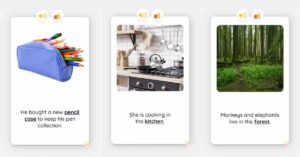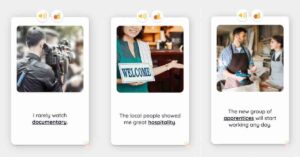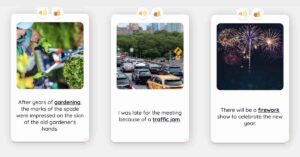How To Practice Ielts Speaking
You’ll find lots of help and resources for IELTS speaking practice in this Speaking section of the website but on this page, I want to show you a specific technique that will make a massive difference to your speaking skills.
One of the main reasons for pauses, hesitations and lack of fluency in the speech of non-native speakers is that they’re translating everything they say from their native language before they speak.
Once you learn to think in English, the speed, fluency and accuracy of your speech will improve considerably and your language will sound far more natural.
Is it really possible for you to think in English?
Yes, most definitely. Like everything else about learning a language, it just takes practice. So, I recommend that you seriously consider making this type of IELTS speaking practice a part of your everyday routine.
There are 3 levels to this technique. You should be able to use at least one of them in almost any situation in your everyday life so you can be practicing all day long if you want to.
The 3 levels:
I really can’t overemphasise the difference this technique will make to your speaking skills. At the bottom of the page, I share a quick story about how I used this technique myself but first, I want to tell you all about the method and show you how to use it.
The IELTS Speaking Practice Technique
Level 1 – Words
Make your whole day one long IELTS speaking practice by thinking of the English words for the objects you can see, your activities and the activities going on around you.
For example, as you wake up and get ready for the day ahead, think of words like these:
When you’re at work, think of words like these or whatever is relevant to your job:
If you study or are a stay at home parent, you’ll have different sets of vocabulary.
If you practice words in this way every so often throughout your day, you’ll be thinking about a huge amount of vocabulary in the most natural way possible.
It won’t be long before you don’t need to make any effort to think because the word will just pop into your head when you look at the object or see the activity.
You’ll also be learning new vocabulary as there are bound to be things you don’t yet know the English word for. You don’t need to look new words up immediately. Make a quick note of them in your own language and check them out later.
Level 2 – Sentences
Thinking in words is great when you’re really busy but when you’re not quite so rushed, try thinking in complete phrases and sentence.
Keep them simple at first until you become more confident.
For example, at the start of the day think:
In the evening you might think:
You’ll be practicing a whole range of grammar skills as well as reinforcing your vocabulary.
When you’re ready and want to ramp up your IELTS speaking practice, try thinking in more complex sentences. For example:
Don’t worry about making mistakes because no-one is listening to your thoughts except you. That’s why this type of IELTS speaking practice is so powerful and effective. You are under no pressure to get the language absolutely right as you would be in a conversation, and you don’t need to translate it word by word or phrase by phrase. Use the language you know well and just let it flow naturally.
I promise you that it will get easier the more you do it.
Level 3 – Narrative (telling a story)
You’ll need a little more time for this one but it can still easily become a part of your everyday life and here’s why.
All of us spend a lot of time creating stories in our head about our lives without even realising we’re doing it. We create stories about what happened to us earlier in the day or further back in the past. We create stories about what we think will happen in specific situations in the future. Think about it for a minute and I’m sure you’ll agree it’s true.
So, since you’re going to be doing it anyway, you might as well create your thought stories in English to get the practice!
You can also imagine that you’re telling a friend about something. It could be almost anything, for example:
If you want to practice particular topic vocabulary or a specific grammar tense, choose an appropriate story topic that will enable you to do that.
My Story
Now for my own story that I promised you.
When I was preparing for my final French exams at school, the thinking technique is exactly the approach I used. I would also have my radio tuned into a French radio programme (this was before the days of the internet and podcasts) to immerse myself in the language.
I didn’t always consciously listen to the conversation, but let it play in the background as I got on with other things.
Soon I began to dream in French. What was remarkable was that I was a fluent in my dreams and far better at speaking French than when I tried it for real. In other words, I could think in French. I was so frustrated when I woke up and much of that fluency had disappeared.
However, it did show me that I had the ability to speak French competently and fluently. The language was all stored away in my brain somewhere. I’m guessing that when I was awake, I was blocking it in some way, probably through my lack of confidence and the fear of making mistakes. As I’ve already mentioned, the thinking method takes away that pressure and frees up the mind.
Did I pass my exam? Yes, I did and I can remember the speaking test as if it were yesterday. I was very nervous but once I opened my mouth the language just flowed out. I have no doubt that this was because I’d practiced thinking in French using the technique I’m recommending that you use to learn to think in English.
Of course, you will need to practice speaking out loud as well but that will be so much easier once you can think in English, so do use this technique as part of your regular IELTS speaking practice.
More Help With IELTS Speaking Practice
You’ll also find sample questions and answers on all the IELTS Topics Vocabulary pages. See the menu in the sidebar. You’ll find these invaluable for your IELTS speaking practice. à à à
- Home ›
- IELTS Speaking ›
- IELTS Speaking Practice
- Back To Top



